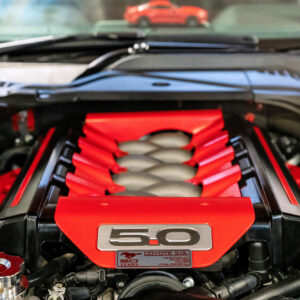When it comes to engine performance, cc and hp are two terms you’ve probably heard a lot. This shouldn’t come as a surprise, especially since they’re both key metrics in helping drivers understand their vehicle’s engine capabilities.
What Is Cc in an Engine?
Cubic centimeters (cc) is the unit of measurement of a vehicle’s engine displacement, which is the total volume of all the cylinders in the engine. This means cc also indicates the total amount of air and fuel an engine can push through the cylinders during a complete cycle.
In most cases, a higher cc value means a larger engine with bigger or more cylinders, but this doesn’t always hold true. Today, you’ll find plenty of smaller engines with turbochargers that have greater engine displacement than bigger engines.
Displacement in older vehicles was also measured in cubic inches (ci), while in the present day, most vehicles are measured in liters.
What Is Horsepower?
Horsepower (hp) is one of the most important measurements when it comes to engine power. It refers to how fast a vehicle’s engine produces force, which can be used to determine its maximum running capacity.
The higher the horsepower, the more power is sent to the wheels, resulting in greater acceleration. However, keep in mind that your vehicle’s acceleration can still vary depending on other factors, such as its total weight and torque.
How Are Horsepower and Cc Related?
Horsepower and cubic centimeters are both key metrics in defining a vehicle’s engine performance. However, they measure two completely different aspects. Horsepower is all about acceleration and top speed, while cubic centimeters focuses on engine displacement and torque.
Obviously, some vehicles will have greater horsepower, while others have better displacement, but what really matters is what you need. If you’re looking for a fast vehicle with timely acceleration, go for one with high horsepower. If you need a vehicle with greater towing capacity, then the one with greater displacement is ideal.

Cc vs. Hp: How Are They Different?
It’s easy to say horsepower and engine displacement are two different aspects of engine performance, but how exactly do they differ?
Definition
The most obvious difference between the two is their definition. Horsepower is the measurement of engine power, while displacement is the measurement of the volume or size of the engine.
Unit of Measurement
Displacement is typically expressed in cubic centimeters, where one liter is equal to 1,000 cc. On the other hand, horsepower, or hp, is the most common unit of measurement for engine power. However, it can also be expressed in kilowatts (kW), where one hp is around 0.746 kW.
Calculation
To calculate your engine’s displacement in cubic inches, you’ll need to measure the bore or diameter of each cylinder. Multiply this by pi and the stroke of the crankshaft to get the swept volume of the piston. Then, multiply the product by the total number of cylinders.
- Engine displacement = (π x (bore ÷ 2)² x stroke of the engine) x number of cylinders
Meanwhile, calculating your vehicle’s horsepower requires you to know your car’s maximum torque and maximum revolutions per minute (RPM). From there, you just have to multiply the two and then divide the product by 5,252.
- Horsepower = torque x RPM/5252
Influencing Factors
Did you know that several factors affect your vehicle’s engine displacement and horsepower? When it comes to engine displacement, your engine’s design, bore, stroke, and number of chambers all affect the end result.
In a similar manner, engine design, tuning, capacity, and size all influence your vehicle’s horsepower. The number of valves and their timing, the type of fuel you use, and other factors also affect the horsepower.

How To Convert Cc to HP
Converting cc to hp isn’t going to yield exact measurements, but you can certainly still try. You can find online calculators to do the conversion for you, but here are two methods if you want to do it manually:
For Four-Cycle Engines
This first method is only applicable for small engines with four cycles. Because a four-cycle engine with 32.2 cc will produce one horsepower, experts devised the following formula:
- cc 32.2 = hp
For example, a small, four-cycle engine with 200 cc can produce around 6.21 hp.
For Other Engine Types
Because so many factors can affect horsepower, there’s no sure way to convert cc to hp. However, you can use these two formulas to at least get a range:
- cc 15 = hp
- cc 17 = hp
For example, an engine with 1500 cc will roughly produce around 88.24 to 100 hp. Using a range instead of a single number helps you consider the other factors that can affect your vehicle’s horsepower.
Why Convert Cc to Hp?
As a metric that measures displacement in an engine, cc doesn’t have an equivalent metric in electric cars, which rely on electric motors. However, electric motors do have a power output. This means you can convert a combustion engine’s cc to hp, which you can then convert again into kW. From there, you can use the kW measurement to compare the combustion engine to an electric vehicle’s electric motor. While this isn’t the most accurate method of comparing the two, if you only have the combustion engine’s cc, it’s the closest you can get.
Ultimately, the cc and hp of an engine are related but separate measurements that can help you determine a vehicle’s power and capabilities. Knowing what these terms stand for and what they indicate about an engine can help you understand your vehicle’s engine better.
Any information provided on this Website is for informational purposes only and is not intended to replace consultation with a professional mechanic. The accuracy and timeliness of the information may change from the time of publication.






























